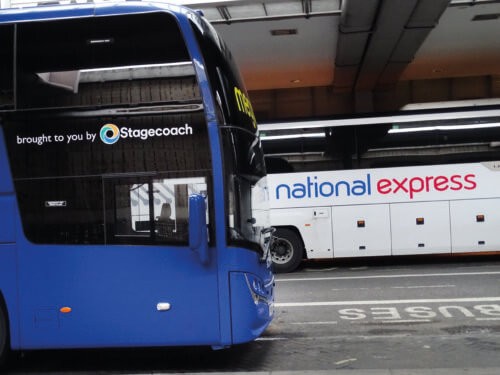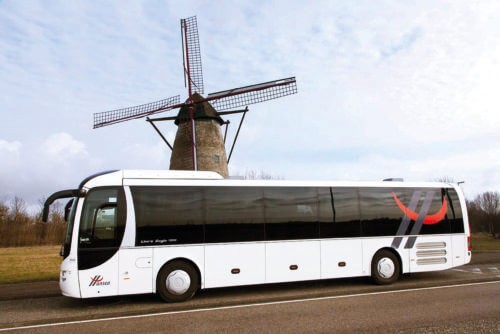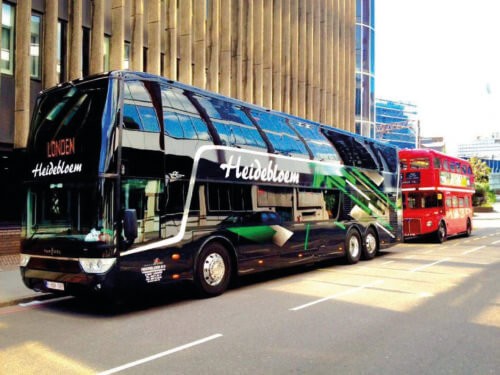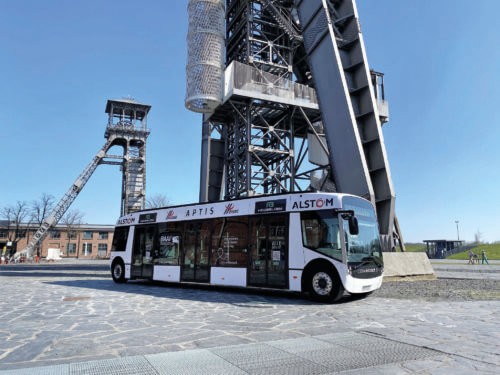
A surprise move has seen Stagecoach opt for a £594.9m cash deal with an infrastructure management company that already has a bus group in its extensive portfolio
Following the initial buzz of a possible merger with National Express, first announced on 21 September 2021, it appears that the mooted ‘significant operational efficiencies’ that could be gained between the two groups has not been enough for the deal to continue to be recommended, and a new name has now entered the frame with a new offer.
Had the National Express merger been completed, it would have meant that National Express would have owned 75% of the combined group and Stagecoach 25%. In addition, National Express could have utilised Stagecoach’s depot network to run and maintain its coaches, and similarly used Stagecoach’s UK footprint to grow its National Express Transport Solutions (NETS) private and corporate coach hire division and National Express Accessible Transport (NEAT), which specialises in accessible transport and special education services.
The merger would have delivered additional savings by rationalising duplicate costs, including back office, scheduling, planning, technology, including migration to what it termed ‘best-in-class’ apps to provide an optimised customer experience, and adoption of operational best practices for engineering.
Following the announcement on 14 December that National Express Group and Stagecoach Group had reached an agreement on the terms of a recommended all-share combination of the two groups, the Competition and Markets Authority (CMA) then announced on 26 January that it had issued an Initial Enforcement Order (IEO) to prevent National Express or Stagecoach from disposing of material assets. This delayed completion of the proposed sale of the marketing, retail and customer service activities of Stagecoach’s inter-city coach businesses to ComfortDelGro beyond the expected date of 28 February, and these activities remain under the ownership of Stagecoach, which stated that plans for these businesses will be reviewed in due course.

The new offer
On Wednesday 8 March, Stagecoach announced that it recommending to its shareholders to accept a cash offer of £594.9m from Inframobility UK Bidco Limited, a company indirectly wholly owned by Pan-European Infrastructure III, an infrastructure fund managed and advised by DWS Infrastructure.
DWS is a long-term infrastructure investor which says it has a ‘proven track record and extensive expertise in unlocking the value of its portfolio companies using its experience, network and ability to deploy further capital in return enhancing investments.’ Transport and essential infrastructure represent one of DWS’ core sector of focuses, with investments in the such as Corelink, Kelda (the owner of Yorkshire Water) and Peel Ports where DWS Infrastructure has actively supported capital expenditure investments of £1 billion during its ownership. The firm has also invested in other European transport platforms, including Hansea, a leading Belgian public bus operator, where it is aiming to support the acceleration of the operator’s growth strategy and has agreed a roadmap for the replacement of the company’s bus fleet with low or zero-emission vehicles.
Stagecoach’s directors, who have been advised by Deutsche Bank and RBC as to the financial terms of the offer, said they consider the terms of the offer to be fair and reasonable and that they therefore intend unanimously to recommend that Stagecoach shareholders accept or procure the acceptance of the new offer.
Hamish Mackenzie, Head of Infrastructure at DWS said: “Stagecoach is a fantastic business with an exciting future as a central player in a revitalised bus and coach market. As a long-term investor in essential services with a strong track record in the and European transport sectors, DWS Infrastructure will back Stagecoach to rapidly capitalise on the growth opportunities presented by increased public and private investment in bus and coach. We are focused on supporting Stagecoach and its management team to deliver their strategy for the benefit of passengers, local communities and employees, as well as helping achieve ambitious plans for reaching Net Zero. We are pleased the Board of Stagecoach has unanimously recommended our offer and we look forward to working with the existing management team to grow the business sustainably for the long-term.”
Stagecoach Chief Executive Martin Griffiths said: “Stagecoach is a leading multi-modal public transport operator and the proposed offer presents a major opportunity to maximise the significant growth potential ahead as governments seek to deliver economic recovery, level up communities, provide better health outcomes for citizens, and transition to a net zero future. We believe it will open a new and exciting chapter for Stagecoach, backed by a team who share our vision for a more sustainable future. We also believe it will deliver positive outcomes both now and in the long-term for all of our key stakeholders: the customers and the communities we serve, the people who deliver our high-quality transport services, our partners in national and local government, and the investors who have supported our continued success over many decades.”
Stagecoach staff were informed about the new offer on the morning of its announcement via the Blink employee app, which also confirmed that under the new deal, the Stagecoach brand will continue to be used, the current management team of Martin Griffiths and Ross Paterson as Chief Executive and Finance Director respectively, and Carla Stockton-Jones as UK Managing Director, will remain with the support of DWS, and Stagecoach’s headquarters in Perth and its central locations in London and Stockport will be retained.

Looking to the future
DWS Infrastructure said that it sees significant opportunities for Stagecoach in the UK and is well-placed to support Stagecoach with its existing growth strategy. In particular, the firm intends to accelerate Stagecoach’s investments in electric buses and associated charging infrastructure in order to enable it to become the leading zero-emission bus operator in the UK.
In addition, DWS said it is committed to working with Stagecoach’s management team through the structural change in the bus market and the opportunities it presents, including the introduction of Enhanced Partnerships and franchising in the regional bus market. Stagecoach is also currently a shortlisted bidder for two bus contracts in Dubai, which DWS says it intends to pursue as well as consider any additional opportunities identified by Stagecoach management to diversify and grow the business overseas.
DWS transport experience
DWS Infrastructure acquired the Hansea Group, a coach and bus operator in Belgium, in 2019. Hansea provides urban and interurban transport services under the authority of public transport companies De Lijn and TEC. It is also active in the school and personnel transport segments and provides coach services. In addition, two of its companies have their own travel agencies.
Hansea’s employs 1,350 staff, with a fleet of 874 coaches and buses spread over 32 depots throughout Belgium, including a number of coach operators such as Heidebloem, which operates a modern fleet of coaches and has recently opened a brand new depot in Lanaken. The group has also trialled new zero-emission buses such as the Alstom Aptis in Limburg, as well operating CNG-powered buses. The most recent addition to the group was coach and bus operator Van de Voorde in 2020, and through its Belgian operations the company has experience of being involved with a coach and bus group that shares many similar aspects of its operation with Stagecoach, particularly as the UK looks to operate with more franchise models in places such as Manchester.


